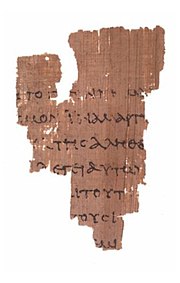John 18:38
[1] The Greek word rendered as "truth" in English translations is "aletheia", which literally means "unconcealed" and connotes sincerity in addition to factuality and reality; whereas Jesus' use of the term appears to indicate absolute, revealed knowledge.
While Pilate's question—whether intended philosophically, jestfully, rhetorically, or born of frustration at the lack of a plain answer—is by no means the only incident of someone questioning the nature of truth, it has been drawn upon many times as a significant occurrence thereof.
[citation needed] Friedrich Nietzsche wrote of the line and extended praise to Pilate: "Do I still have to add that in the entire New Testament there is only one solitary figure one is obliged to respect?
The noble scorn of a Roman before whom an impudent misuse of the word 'truth' was carried on has enriched the New Testament with the only expression which possesses value - which is its criticism, its annihilation even: 'What is truth?..."
J. L. Austin, the ordinary-language philosopher, in a symposium on truth, begins with some paragraphs from the Bacon essay but expands the commentary to many pages, using the approaches of modern logic.
In Robert A. Heinlein's novel Stranger in a Strange Land, principal character Jubal Harshaw, in response to Valentine Michael Smith’s query "What is 'truth'?

